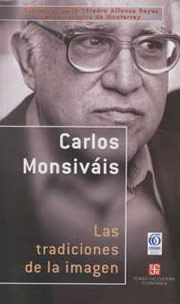 |
 |
 |
 News Around the Republic of Mexico | March 2005 News Around the Republic of Mexico | March 2005  
An Historian's Perspective
 Wire Services Wire Services


| Monsivais, 67, is recognized as one of the pre-eminent historians and intellectuals in Mexico, as well as in Latin America as a whole, and he is well-known as a strong critic of Fox's conservative government.

|
Mexican writer and journalist Carlos Monsivais criticized the relations between the U.S. and Mexican governments and the presence of vigilante groups in Arizona, which have been set up to help intercept migrants.

In an interview with EFE, Monsivais, whose articles and books are widely read throughout Latin America, said that U.S. President George W. Bush had made it clear that none of the Mexican government's arguments or demands would speed up the crafting of a migration agreement between the countries.

"There are many factors involved in this problem, both economic and social," the writer said during a visit to Tucson, where he used the words "formal, diplomatic, predictable and empty" to describe the brief summit in Texas involving Bush, Mexican President Vicente Fox and Canadian Prime Minister Paul Martin.

He added that a migration reform such as that proposed by Bush would not solve the problem of undocumented immigrants.

"The need moves forward, washes away (and) crosses frontiers and resists every type of assault," Monsivais said referring to the flood of immigrants to the United States, where it is estimated that about 11 million undocumented persons live, nearly half of them Mexicans.

He added that a natural relationship exists between the two countries because of the millions of Mexicans living in the United States and Mexico's dependence on the billions of dollars in remittances sent home by its citizens abroad each year.

Just in January, remittances by Mexicans living abroad totaled some US1.35 billion, up 28.1 percent with respect to the same month a year ago, according to the Bank of Mexico.

It is precisely for that reason that Monsivais referred to the concern that exists in Mexico over anti-immigrant and antiMexican sentiment in the United States, particularly along the border in Arizona.

The author said that the efforts of the U.S. government to militarize the frontier and extend the border fence will not markedly reduce the migratory flow because both countries have a big stake in ensuring that cheap Mexican labor continues to be available in the United States.

"It's not only the need on the part of Mexicans to seek jobs, but also the U.S. farmers' and industries' need for Mexican labor," he said.

Regarding the announcement of the self-styled - and privately organized - Minuteman Project to monitor the Arizona border and help detain undocumented foreigners who try to cross the Arizona desert, a project set to take place in April, Monsivais said that it was up to the Mexican government to indignantly reject the hunting down of Mexicans.

"This hurts relations, but above all it violates the human rights of Mexicans in the United States to an extreme degree," he emphasized.

He added that acts of racism and persecution will in no way have any affect on or reduce the migratory flow between the two countries.

Monsivais, 67, is recognized as one of the pre-eminent historians and intellectuals in Mexico, as well as in Latin America as a whole, and he is well-known as a strong critic of Fox's conservative government.

Over the last 40 years, the writer has documented the changes in education, culture and the political environment in his country.

In addition, he has written more than 25 books and hundreds of articles that have been published in prestigious newspapers in Mexico, Latin America and the United States.

With respect to the struggle currently going on in the Mexican Congress to give the right to vote to Mexicans living abroad, Monsivais characterized as "pathetic" the approach taken by Mexico's lower house and the federal election authorities.

"They haven't studied the case. They haven't documented it. They've improvised," he said. "The senators didn't have the slightest idea how the vote would be implemented abroad when they approved it. They didn't know how much money it was going to cost, or how the consulates were going to function" to help administer the balloting.

When the expectations of Mexicans abroad, mainly in the United States, regarding being able to vote in the 2006 presidential election began to grow, the election authorities announced that the plan "was not viable."

"If it was not viable, why didn't they say so at the beginning. It is really monstrous what they did," he asserted. | 
 | |
 |



